U.S. Seeks to Head Off Economic Instability in Jordan
- Share via
WASHINGTON — The United States has quietly launched an international effort to stabilize Jordan’s leadership in the face of fears that Iraq might try to topple the new monarch and that economic turmoil could destabilize the country’s currency, U.S. officials said Saturday.
The package of measures, pitched by President Clinton in a series of messages to world leaders, includes a request to Congress to free up $300 million in U.S. aid and intervention by the International Monetary Fund to prevent a run on Jordan’s currency, the dinar.
U.S. officials believe that Jordan’s economy is its greatest immediate vulnerability.
“This is a moment of opportunity to help Jordan economically, which is the biggest short-term problem,” a senior administration official said. “It can use all the help it can get.”
The focus is on economic measures because Jordan’s financial situation makes it particularly vulnerable to political instability, including unrest orchestrated by outside powers, U.S. officials say. In that context, Iraq represents the single greatest security threat.
“There’s obvious concern about Iraqi attempts to meddle in Jordanian affairs, as they’ve tried to do in the past. There’s also a lot of pro-Iraqi support in Jordan, which might try to manage popular disturbances. That’s been done before too,” the senior official added.
Clinton launched the diplomatic and economic campaign after receiving word Thursday that King Hussein would not recover despite last-ditch cancer treatment at Minnesota’s Mayo Clinic.
The intent, U.S. officials say, is to ensure that the leadership transition in Jordan will not be threatened by regional rivals or financial speculators.
Crown Prince Abdullah, who in effect took over Saturday when he was sworn in as regent, faces enormous challenges as he tries to fill the shoes of his father.
But so far, the response to the U.S. initiative has been limited.
Clinton has appealed to governments throughout Europe and the Mideast to take whatever steps they can to help Jordan’s new leader.
On Friday, he sent messages to his counterparts in the Group of 7 alliance of Western industrialized nations asking for help in protecting a desert kingdom that has no oil, gas, gold or other natural resources.
Clinton pressed Japan and France specifically to forgive some of Jordan’s debt. Neither has responded, U.S. officials said Saturday. Jordan’s total foreign debt in 1998 was 6.4 billion.
Following the 1994 Jordan-Israel peace treaty, the United States forgave Jordan’s debt of more than $700 million. The nation has not accumulated any significant debt to Washington since then, U.S. officials say.
The president has also urged Israeli Prime Minister Benjamin Netanyahu to open markets in the West Bank to Jordanian goods. Jordan does less than $50 million in trade annually, while Israel has a $50-billion annual economy, U.S. officials said.
Opening up markets “would make good economic sense, and it would also be good for the peace process,” the senior official said.
Yet despite nervousness in Israel about the potential for instability in neighboring Jordan, the Israeli government has not shown any interest in cooperating.
Clinton also talked to leaders of the oil-rich sheikdoms in the Persian Gulf about economic and political measures to aid Jordan.
He secured a commitment from the United Arab Emirates, the only Gulf regime with significant cash, to deposit funds in Jordanian banks to keep them stable. The plummeting price of oil has hurt the cash flow of several Arab governments, limiting what they can do for Jordan.
Saudi Arabia and Kuwait, which have had cool relations with their fellow monarchy since the 1990-91 Persian Gulf War, have notified Amman that they will resume selling oil to Jordan at preferential prices. The practice was halted when King Hussein supported Iraq after its 1990 invasion of Kuwait, a policy he later reversed.
For its part, the White House announced Saturday that Clinton will ask Congress this week to expedite a plan to provide Jordan an extra $100 million a year for the next three years.
In a statement issued from the White House on Saturday, Clinton said: “The United States stands by Jordan and is determined to do all that it can to support and strengthen it.”
The aid was promised under terms of a peace agreement signed at Maryland’s Wye Plantation in October by Israel, the Palestinians and Jordan.
U.S. officials now acknowledge that they factored Jordan into the financial arrangements because the administration recognized that the king’s health was failing. The talks provided an opportunity to provide more aid.
The request for $300 million is in addition to the $225 million in assistance that Washington will provide in 1999 and 2000.
More to Read
Sign up for Essential California
The most important California stories and recommendations in your inbox every morning.
You may occasionally receive promotional content from the Los Angeles Times.













